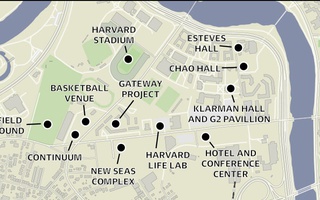The Harvard-Allston Task Force debated aspects of Harvard’s Institutional Master Plan for Allston development at its meeting Monday evening, with some residents and task force members questioning whether the University’s construction projects will have a positive short-term impact on Barry’s Corner.
The University has pledged to revitalize the quiet intersection, which sits at the crossing of North Harvard Street and Western Avenue.
Harry E. Mattison, an Allston resident who sits on the task force, expressed skepticism that Harvard will be able to revive Barry’s Corner in the next five years because several planned projects in the area are not scheduled for completion until years later.
“The incredible location [that we want is]...not coming in five years,” Mattison said. “It might be coming in 10 years, it might be coming in 50 years, but if this is an important area to us, and if we’re still going to view this as the hub and focal point in our new place where the University and the neighborhood are going to meet...we need to think of something to do.”
Mattison’s comments followed a presentation from Harvard detailing its master plan, which outlines nine projects the University intends to implement in the next 10 years. Residents have a 60-day period to submit comment on the master plan, which the University submitted to the Boston city government last month and hopes to have approved in October.
At Monday’s meeting, task force members and residents also expressed concern about traffic congestion in Barry’s Corner and the neighborhood more broadly.
Brent C. Whelan ’73, a task force member who lives in Allston, criticized the University’s decision not to include in its 10-year plan “Stadium Way,” a road that would connect Harvard’s proposed science district with Barry’s Corner.
The road, which was proposed in 2007 as part of Harvard’s since-downsized 50-year plan for Allston development, remains part of the University’s long-term vision for the neighborhood. But Whelan said that delaying that development “is setting up an almost inevitable congestion.”
In response to the criticism about the immediate future of Barry’s Corner, Kevin Casey, Harvard's associate vice president for public affairs and communications, said that there will be other improvements to the area in the next few years, including road improvements and green space accompanying the projects. By way of example, he cited the planned construction of a grove of trees in Barry’s Corner.
“It is true that our IMP is about nine projects and renovations, but those include those things that come with it,” Casey said.
Residents also raised several other concerns about elements of the master plan, such as the proposed basketball arena and what they described as a large amount of planned parking space.
Although the meeting featured sometimes heated criticism of the master plan, Tim McHale, a Brighton resident who sits on the task force, called the master plan “pretty well thought-out” and “really impressive.”
“It’s a lot of years of work, and I think Harvard needs some acknowledgement that they’ve done a good job,” McHale said. “Now, we have a lot of concerns with it…but as a document it turned out really well.”
Christina L. Marin, a task force member, also expressed some optimism about the planning going forward. She wrote in an email after the meeting that “the neighborhood will go through some growing pains as it transitions into the community we all envision.”
“Many of us are looking forward to the neighborhood that Allston can become,” Marin wrote. “Right now, we are looking to minimize the impact of construction and ensure even the minor details in the Institutional Master Plan have been thought through.”
In future meetings, the task force plans to move forward with further discussion of the master plan and possible community benefits, including transportation and education. Weekly meetings are planned through early October.
—Staff writer Madeline R. Conway can be reached at mconway@college.harvard.edu. Follow her on Twitter @MadelineRConway.
Read more in University News
Securitas Guard Tessalon Bishop Remembered as Devoted Family ManRecommended Articles
-
Harvard Embarks Upon Revision of Campus Expansion PlanAfter the city of Boston issued its 50-page scoping determination last month for Harvard’s forecasted development in Allston for the
-
City Responds to Allston PlanAfter the City of Boston issued a 50-page report from city officials and community members on Harvard’s forecasted development in
-
City to Revamp Barry's CornerAllston residents responded with cautious approval to proposals presented by the City of Boston to revitalize Barry’s Corner and Holton
-
Harvard-Allston Task Force Criticizes University for Not Providing BenefitsMembers of the Harvard-Allston Task Force and other Allston residents criticized Harvard for what they called a failure to include sufficient benefits for the neighborhood in their Barry’s Corner development plans at a meeting on Monday evening.
-
 Lessons From Barry's Corner
Lessons From Barry's Corner













